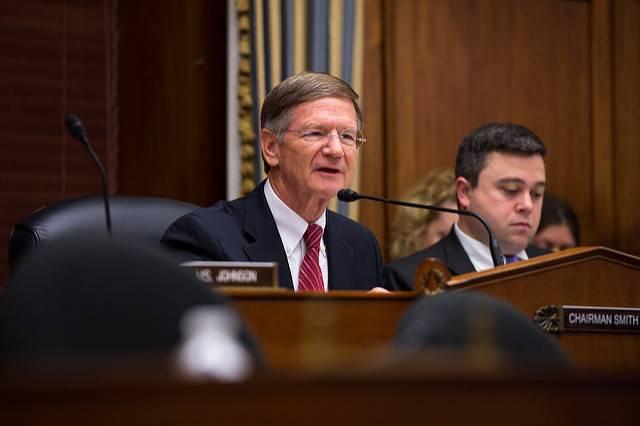
U.S. Rep. Lamar Smith is wasting no time under the new administration. Long a foe of the Environmental Protection Agency, the chair of the House Committee on Science, Space and Technology held a hearing on Tuesday titled “Making EPA Great Again.”
To Smith’s critics, his antics are part of a longstanding witch hunt designed to intimidate climate scientists and NGOs. Much of Smith’s drive to hold hearings targeting climate science stem from his disdain for the various state investigations into ExxonMobil. Those investigations seek to gauge whether or not the company (long a benefactor of Smith's) suppressed nearly 30-year-old research that indicated climate change put the planet’s long-term viability at risk.
The Texas Republican claimed his hearing aimed to investigate how the EPA uses science as it develops regulations. As quoted by the Washington Post, Smith opened the hearings by declaring: “Unfortunately, over the last eight years the EPA has pursued a political agenda, not a scientific one.”
Those who testified include Kimberly White of the American Chemistry Council; Jeffrey Holmstead, a former deputy EPA administrator during the George W. Bush administration who has reaped millions from coal companies and is now a lobbyist for fossil fuel interests; and Richard Belzer, an environmental consultant. Democrats called Rush Holt of the American Association for the Advancement of Science to testify.
Much of the discussion centered around the Secret Science Reform Act of 2015, which Smith first submitted two years ago.
The legislation would prevent the EPA from accessing scientific studies that are “not transparent or reproducible.” At a first glance, that would appear to be a fair request of any organization or government agency. The problem, as many environmental groups including the Union of Concerned Scientists have pointed out, is that the bill would prohibit the EPA from using studies that contain confidential information or relate to single events, such as oil spills.
As a result, health studies that include patient data or studies of disasters such as the 2010 San Bruno explosion would not be available to EPA researchers.
“This legislation wasn’t designed to promote good science,” Dr. Andrew A. Rosenburg, director of the science and democracy for the Union of Concerned Scientists, wrote of the bill in April 2015. “It was crafted to prevent public health and environmental laws from being enforced.”
Congressional Republicans claim that EPA researchers could still conduct their research, but just not use data in the studies that would risk the agency revealing citizens’ personal information or business trade secrets.
But the Congressional Budget Office replied that such a requirement would cost the agency as much as $250 million annually – and Smith’s bill would cap the EPA’s expenditures to stay compliant with the “secret science” act at $1 million per fiscal year.
The hearing also focused on a contentious debate over whether researchers at the National Oceanic and Atmospheric Administration followed proper research protocols during a landmark climate change study.
That paper attempted to put to rest a common climate-denial claim that there has actually been a “pause” in global warming since 1998. As published in a sister paper to the British tabloid Daily Mail, the whistle-blower, NOAA scientist John Bates, claimed the study was never subjected to rigorous NOAA evaluation procedures – even though other scientists have independently verified its findings.
No credible evidence has emerged that shows NOAA scientists fudged any data, and the overwhelming opinion of climate scientists is that climate change is well underway.
Critics say Smith’s actions are just a part of Republicans’ agenda to eviscerate both climate change research and policy, further proving the GOP is caving to the U.S. fossil fuel industry.
“No one should forget that Lamar Smith and his Republican colleagues were using ‘alternative facts’ in the House Science Committee before the Trump administration made them popular,” said Liz Perera, climate policy director of the Sierra Club, in a written statement.
“Yelling at science will never change its findings that climate change is a very real threat to every one of our communities. This is another incident of oil-soaked Republican politicians burying their heads in the sand while the seas are rising, and we ought to all be very concerned.”
Meanwhile, three time zones away from Capitol Hill, lawmakers have not forgotten about ExxonMobil and its alleged cover-up of climate change research. At least 18 Democratic members of California’s U.S. House delegation have urged the state’s new Attorney General Xavier Becerra to continue the investigation of the company opened by his predecessor and now U.S. senator, Kamala Harris.
Image credit: Flickr/NASA HQ Photo

Leon Kaye has written for 3p since 2010 and become executive editor in 2018. His previous work includes writing for the Guardian as well as other online and print publications. In addition, he's worked in sales executive roles within technology and financial research companies, as well as for a public relations firm, for which he consulted with one of the globe’s leading sustainability initiatives. Currently living in Central California, he’s traveled to 70-plus countries and has lived and worked in South Korea, the United Arab Emirates and Uruguay.
Leon’s an alum of Fresno State, the University of Maryland, Baltimore County and the University of Southern California's Marshall Business School. He enjoys traveling abroad as well as exploring California’s Central Coast and the Sierra Nevadas.














